Catégories
Documents disponibles dans cette catégorie (441)
 Ajouter le résultat dans votre panier Affiner la recherche
Ajouter le résultat dans votre panier Affiner la recherche
Article
W. Leal ; J.M. Luetz ; M.A.P. Dinis ; G.J. Nagy |The Mediterranean region accounts for nearly 95% of global olive oil production. However, climate change-manifesting in intensified heatwaves, prolonged droughts, and increased pest prevalence-is undermining both the quantity and quality of yiel[...]
Article
Olive oil is one of the most important products in the Spanish agri-food sector, with Spain accounting for 50 percent of world production. Despite Spain’s leadership in global olive oil production, the sector faces significant challenges in comm[...]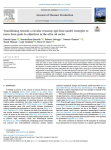
Article
D. Spina ; M. Borrello ; R. Selvaggi ; G. Chinnici ; M. Hamam ; L. Cembalo ; M. D'Amico |Addressing the overuse of natural resources is crucial, and the circular economy (CE) offers a solution by turning waste into value to meet societal needs. CE may support business development without increasing resource exploitation. However, tr[...]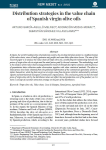
Article
In Spain, the world’s leading olive oil producing country, the existing literature points to a malfunctioning of the value chain, since it hardly generates any profits and some links often incur losses. The aim of this research paper is to analy[...]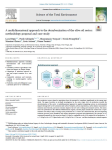
Article
L. Regni ; P. Sdringola ; B. Torquati ; N. Evangelisti ; M. Chiorri ; L. Arcioni ; P. Proietti |The productive sectors related to agriculture have the potential to contribute significantly to the energy transition. The paper describes an in-depth investigation on the extra virgin olive oil production towards the decarbonization of the sect[...]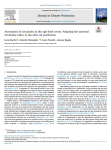
Article
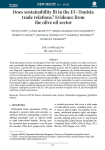
Article
F. Fort ; I. Manetti ; M.R. Pupo D'Andrea ; R. Henke ; R. D'Annolfo ; F. Morandi ; F. DeMaria |Trade agreements between the European Union (EU) and developing countries are often used to promote sustainable development within economic cooperation. The EUTunisia trade relations have a long history, starting with the Association Agreement i[...]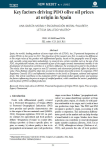
Article
Spain, the world’s leading producer of extra virgin olive oil (EVOO), has 29 protected designations of origin (PDOs) in this sector in 2021. The objectives of this research are, first, to analyze the differences in the origin value of this produ[...]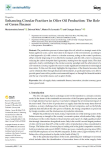
Article
M. Intonti ; D. Mola ; M. De Leonardis ; G. Starace |The production process of extra virgin olive oil, which is a strategic asset of the Italian agrifood sector, can be innovated in its impact on the environment, according to a dual approach: (a) with a view to a circular economy, acting on the wa[...]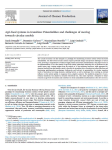
Article
S. Stempfle ; D. Carlucci ; M. Borrello ; L. Cembalo ; B.C. de Gennaro ; L. Roselli ; G. Giannoccaro |The Circular Economy (CE) has emerged as a paradigm for transitioning economic systems toward increased sustainability. The shift toward circular systems requires profound changes and presents challenges at various levels, involving a comprehens[...]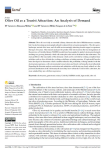
Article
Olive oil is not only an essential culinary element in the diet of Mediterranean countries, but it is also becoming an increasingly attractive element from a tourism perspective. The olive grove landscape, ancient olive trees, and oil mills are [...]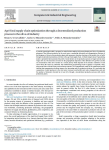
Article
A tactical/operational model is proposed to assist decision-making in harvest planning and olive oil production planning of the different producers in the rural sector, considering allocation and transportation decisions of the kilograms of oliv[...]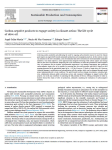
Article
Achieving carbon neutrality and addressing the need for ongoing carbon dioxide removal to meet the climate goal requires an urgent shift towards sustainable production and consumption practices. In this context, we turn our attention to the oliv[...]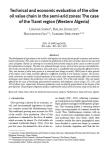
Article
The development of agriculture in the world’s arid regions has always faced specific economic and environmental constraints. This study aims to evaluate the performance of the olive oil value chain in the semi-arid zones of Algeria (Tiaret); by [...]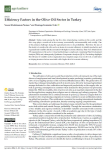
Article
Turkey ranks among the top five olive oil-producing countries in the world, and the olive crop plays a crucial role in its economy, economically, environmentally, and socially. One of the primary challenges facing the agricultural sector is its [...]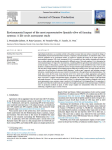
Article
Agricultural production is an essential activity in the global economy that must advance towards the design of sustainability projects hand-in-hand with consumers, companies, and policymakers. An exhaustive study, in line with the guidelines set[...]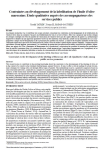
Article
La présente recherche vise à contribuer aux acquis existants concernant les contraintes au développement de la labellisation de l’huile d’olive dans un contexte d’un pays en Méditerranée du Sud, à savoir le Maroc. Elle vise à proposer une lectur[...]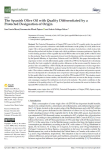
Article
The Protected Designation of Origin (PDO), part of the EU’s quality policy for agri-food products, aims to provide consumers with reliable information on the quality of a food, linked to its origin. Olive oil has perceptible qualities deri[...]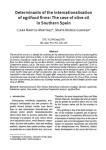
Article
The aim of this article is to identify the conditions for the internationalisation of olive oil producing firms in southern of Spain (province of Jaén), as this region accounts for 20 percent of total world production. To that end, we propose a [...]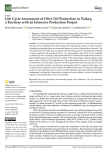
Article
The global warming fight should focus on agriculture, especially on olive crops, due to their potential role in combating it. One of the leading olive oil-producing countries is Turkey; therefore, evaluating and quantifying the environmental imp[...]
Article
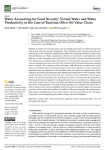
Article
To achieve food security goals, water accounting seems to be one of the most powerful tools to deal with water scarcity management. Thus, indicators, such as virtual water and water productivity, can be considered complementary rather than compe[...]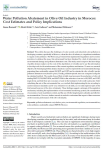
Article
I. Bounadi ; K. Allali ; A. Fadlaoui ; M. Dehhaoui |This article discusses the challenges of water scarcity and industrial water pollution in developing countries, specifically in Morocco, where the olive oil industry is a significant contributor to organic water pollution. The Moroccan governmen[...]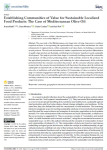
Article
This case study of the Mediterranean extra virgin olive oil value chain aims to contribute empirical evidence to incorporating the agrobiodiversity concept within mechanisms for value enhancement of origin products, within sustainable local valu[...]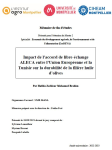
Thèse, Mémoire, Master
Les relations commerciales entre l’Union Européenne et la Tunisie ont une longue histoire qui connait une date charnière avec le Partenariat euro-méditerranéen initié en 2015 dans le cadre du processus de Barcelone. Cette histoire des relations [...]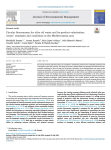
Article
M. Donner ; Y. Erraach ; F. López-i-Gelats ; J. Manuel-i-Martin ; T. Yatribi ; I. Radic ; F. El Hadad-Gauthier |The circular economy and bioeconomy can contribute to transitioning towards more sustainable production and consumption in the olive oil sector. This article is the first to analyse multi-actor strategies and multi-level socio-economic condition[...]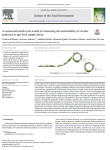
Article
T. Stillitano ; G. Falcone ; N. Iofrida ; E. Spada ; G. Gulisano ; A.I. De Luca |Circular economy (CE) is claimed to be a promising pathway to achieve the Sustainable Development Goals (SDGs), but a reliable metric is needed to validate closed-loop strategies by measuring sustainability performances together with the degree [...]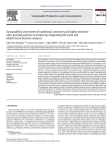
Article
Olive cultivation is the most important agro-ecosystem in the Mediterranean basin. Despite the remarkable intensification of this system (i.e., the use of high tree densities and large amounts of inputs), the environmental and socio-economic imp[...]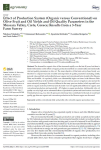
Article
The demand for organic olive oil has increased rapidly over the last 40 years, but there is limited information on the effects of organic production methods on commercially and nutritionally relevant quality parameters in olive oil. The main obj[...]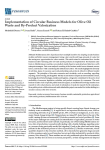
Article
Mediterranean olive oil producers have multiple incentives for adopting circular business models and better resource management, facing water scarcity and huge amounts of waste, but also seeing new opportunities for value creation. This article [...]










